Review for Black Rock Shooter Complete Series Collection
Introduction
I’m getting to this review a little late, but for once it’s not my fault. The review discs turned up after the release date, but as a consolation I get the retail release, complete with cellophane wrap, as opposed to silver discs in paper envelopes. Black Rock Shooter is a veritable pop culture phenomenon, and as most such phenomena, it’s one that has wholly passed me by. I was vaguely aware of some fans importing the 5 episode OVA directly from Japan, when its Blu-ray was released with a Babel of subtitle languages, but I was never really interested in what looked like just another videogame adaptation.
The surprising thing is that it isn’t a game adaptation at all; instead it has had the most fascinating genesis. It all began with a piece of artwork, characters created by illustrator Ryohei "Huke" Fuke. That artwork actually inspired a pop song by Supercell, one that featured the synthetic vocals of digital diva Hatsune Miku. That song led to the OVA episodes, and that in turn led to this 8-episode TV series that was broadcast in the noitaminA block. No video game at all in the process, which is surprising given the name, Black Rock Shooter. There are a couple of things worth noting about this Manga Entertainment release. For one, there is no dub; it’s in Japanese only, with English subtitles. The second thing is that we get it in the UK before it has been licensed and released in the US.
Mato Kuroi is starting a new school, and finds herself drawn to fellow student Yomi Takanashi. But making new friends isn’t easy, especially when there are secrets holding both back. The enigmatic assistance of the school counsellor does little to help. Meanwhile, in another realm, barren and twisted, a girl, the Black Rock Shooter wages battle against oddly familiar figures. This seems to be some epic battle reflecting the internal struggles of Mato, Yomi and the others in their lives, but then the Black Rock Shooter’s struggles start having an impact in Mato’s world.
Eight episodes of Black Rock Shooter, the entire series are presented across 2 discs from Manga Entertainment.
Disc 1
1. How Much More Do I Have To Scream?
2. Dawn Envelops The Sky
3. Tears Held Back Threaten To Spill Over
4. The World I Once Dreamt Of Closes
5. Black Rock Shooter
Disc 2
6. Hope That Time There Shouldn’t Have Been Any
7. Make a Wish on a Star Racing Through the Darkness
8. Let’s Go Beyond This World
Picture
Black Rock Shooter gets a 1.78:1 anamorphic widescreen transfer across these two dual layer discs. Unsurprisingly given that it was a noitaminA title, the show was licensed and released by Siren Visual in Australia, and it’s their PAL converted discs that we get here. The image is clear and sharp throughout, with few signs of compression, and with really strong colour reproduction and detail levels. The only small annoyance might be a smidge of edge-enhancement that becomes apparent when up-scaled on a large flat panel display.
Given its art inspired source, Black Rock Shooter is a feast for the eyes, a show with really strong and effective character design, and a whole lot of work put into the world design, all coupled with vibrant and fluid animation. The real world sequences are warm, rich and lush, dark and ominous when they need to be, and on occasional dull and drab too. The other world is a surrealistic fantasy brought to animated life, full of dark and twisted imagery and visually very breathtaking, and these DVDs put all that across very well. The only shame is that this isn’t available on Blu-ray as it’s very obviously an HD sourced anime. Then again, sub only anime Blu-rays are still as rare as hen’s teeth in the UK.
Sound
Black Rock Shooter comes with a sole DD 2.0 Japanese stereo track, with optional translated subtitles. The audio is clear and well-presented throughout, making nice use of the stereo space, especially when given a little Prologic polish to convey the action, ambience and music of the show. And yes, that theme tune by Hatsune Miku is there in its catchy glory. It’s a nice voice cast, and a very polished production from Siren Visual. The one minor flaw is that the subtitles in the pre-credits sequence for episodes 1 and 8 are both mistimed, and get a little confusing when people are speaking in quick succession. It’s barely two minutes in each episode, and isn’t a fatal flaw, but is annoying nevertheless. Early on in the show, there are some translation notes that flash on screen alongside the dialogue translations, requiring a quick finger on the pause button, but this evens out over the series run.
Extras
Two discs are presented in an Amaray case, one on a hinged panel, with impressive sleeve art on the outside, but understated with an episode listing on the inside. The discs present their content with animated menus.
All of the extra features are on disc 2, beginning with 2 minutes worth of 3D CG Animatics, test footage for the show’s action sequences, with a lot of before and after to compare and contrast.
The Making of Black Rock Shooter lasts 22 minutes, and takes us behind the scenes of the production, again with an emphasis on the CGI side of things. There are interviews with the director and members of the crew along with clips from the show. This isn’t the sort of thing that we usually get with our anime releases in the West, and it’s well worth watching.
There are 12 minutes of TV spots to sell the show, although there are no subtitles for the trailers.
Finally there is the Clean Ending sequence for the show.
Conclusion
How well are you in touch with your inner teenager? Of course it would help more if you actually were a teenager. It would help if you were still at that stage in life where everything that happened was momentous, where every emotion hit like a sledgehammer, the age of first loves, of towering rages, of heart-blackening depressions, and of intense angst. It’s the time where if someone looked at you the wrong way, or you heard them laughing at the wrong time, or if someone blanked you, it would be cause for a lifelong vendetta. If those feelings still resonate within you, then you will get on just fine with Black Rock Shooter.
I have to admit that despite my rapidly advancing decades, I still had enough touch with my inner adolescent to empathise with the characters in this story, young teenagers starting middle school and just beginning to reach out and form friendships, start interacting with people instead of just playing with them, as usually happens when children start to grow up. There are always the popular kids in class, and the outsiders, the in-crowd, and the pariahs. The story focuses initially on the friendship that forms between the outgoing Mato, and the introverted Yomi. It’s not an easy friendship, as Yomi initially appears untrusting and shies away from Mato. But the two find a common interest in their love of a particular picture book.
The first obstacle comes in the form of Yomi’s sole friend Kagari. Kagari used to stick like glue to Yomi when they were children, but an accident left Kagari in a wheelchair, an accident for which Yomi blames herself, and which Kagari now uses to guilt Yomi into caring for her. It’s an abusive and twisted relationship, and one that is threatened when Mato appears on the scene. At the same time, while Yomi is slowly beginning to trust Mato, the fact that Mato is outgoing and gregarious means that she already has other friends, including her best friend Yu. Given the time that they spend together, Yomi continues to feel like an outsider, and an irrational jealousy of Yu develops. It’s all pretty standard teen angst stuff, but it isn’t helped by the school’s guidance counsellor Saya, who has a bizarre counselling technique.
The problem is that the petty jealousies and hurts of the school friends are reflected in a parallel world, where doppelgangers of them battle to the death, re-enacting their emotional conflicts with devastating and jaw-dropping impact. At first this seems like a simple metaphor, but as the show progresses, this bleak, nihilistic world proves to be very real, and very connected to the actual world, as the battles begin to appear in Mato’s dreams, and events in that world begin to have an effect on people in the real world. In this world, Black Rock Shooter is some sort of twisted superhero, and where all these doppelgangers take on the pain and angst of their originals in the real world. When they do battle, and when Black Rock Shooter slays her opponents, it serves to save the real version of the victim by destroying their angst and negative emotions. It turns out that this parallel world had a very real world origin, and Mato gets caught up right in the middle of it.
Visually, Black Rock Shooter is utterly breathtaking. Thematically it is interesting, channelling bits of Dream Eater Merry and aspects of Madoka Magica as well, while creating something quite unique to itself too. But the message in the end is very simplistic, counselling that the pain and angst of communicating, of interacting, and of relationships is far more rewarding in the end than the illusory safety of isolation and separation. It is very much aimed at that young, teenage market, for whom emotional minefields are an everyday occurrence, and a cynical, older viewer might just begin to find Black Rock Shooter’s histrionics a little silly. I quite enjoyed it though. Now shut up and leave me alone. I’ll be in my room, painting the walls black and writing some lyrics.
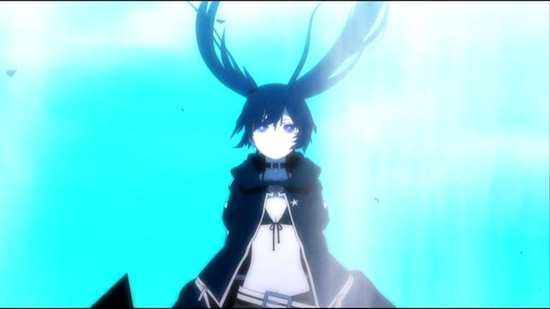
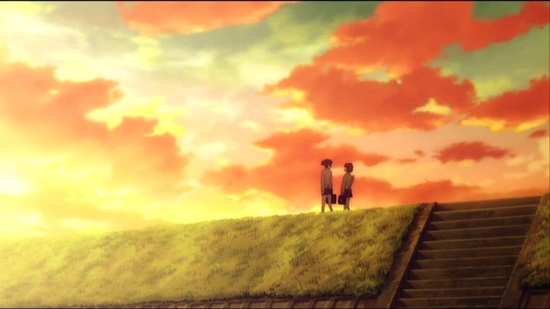
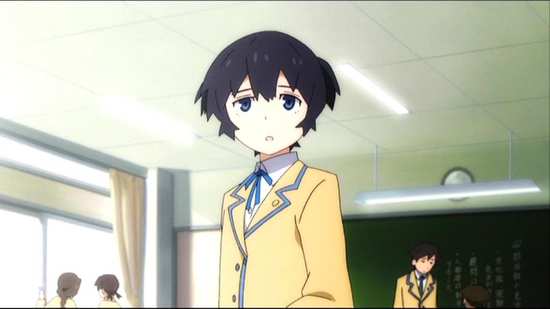
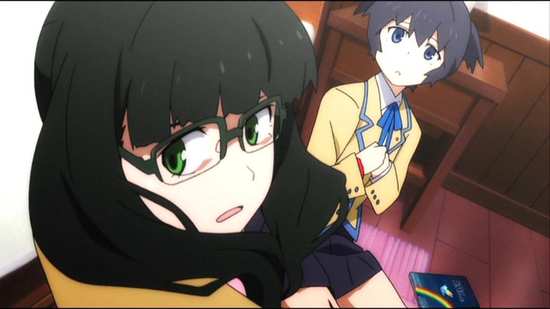
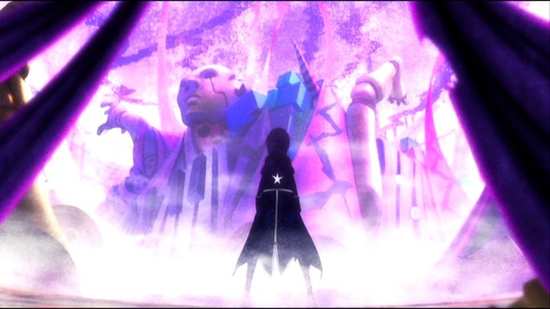
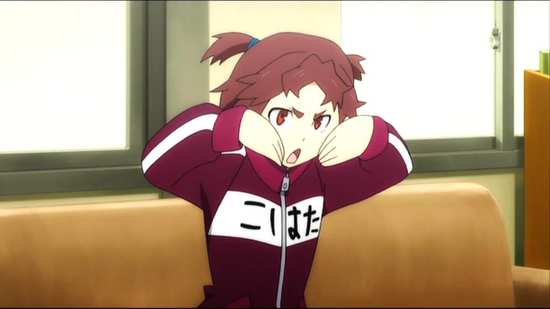
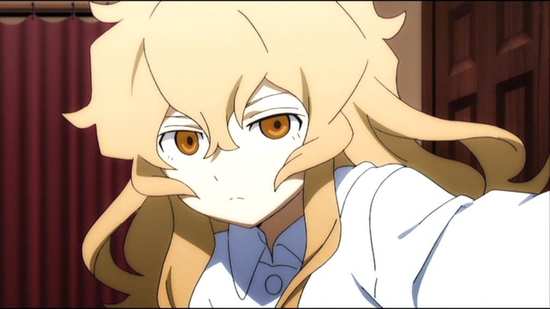
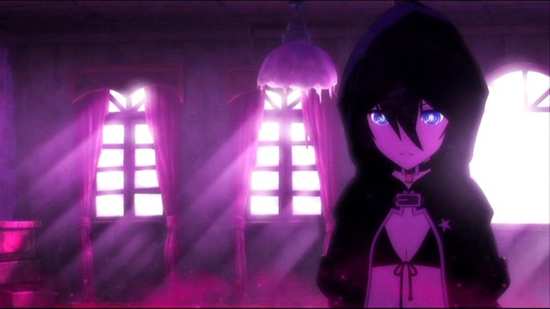
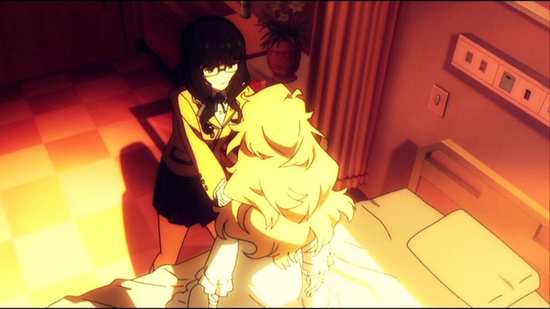
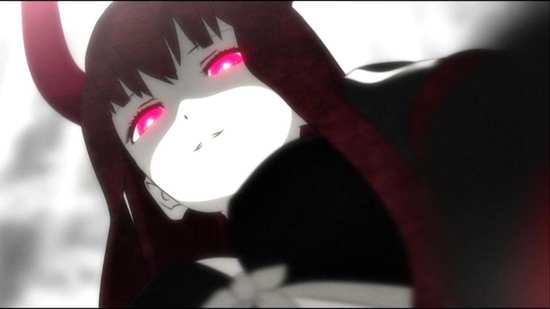
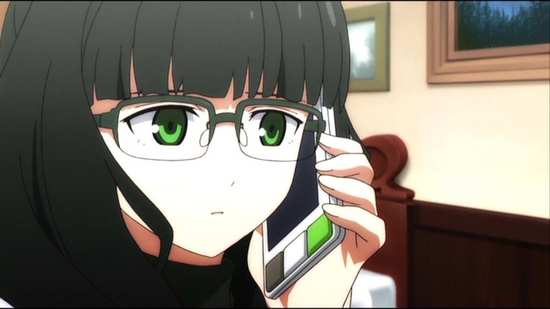
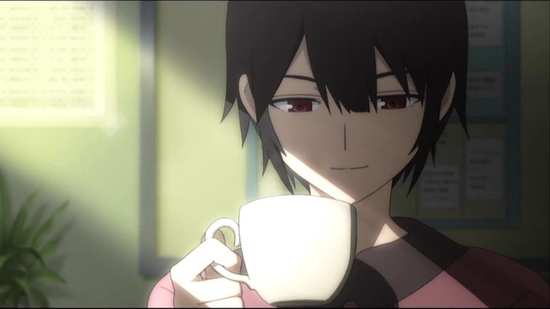
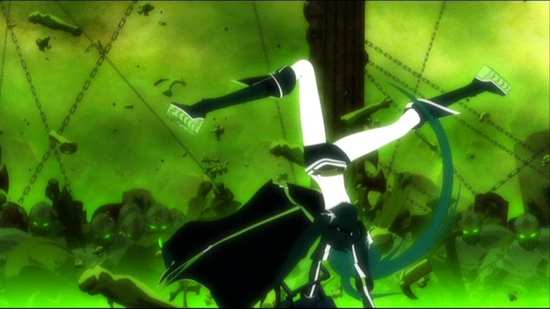
Your Opinions and Comments
Be the first to post a comment!